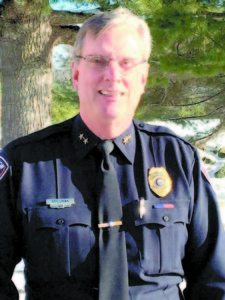A view of the opioid crisis from a public safety perspective
By Richard Stillman
Bridgton Chief of Police
How does the opioid crisis impact public safety?
It has certainly placed overwhelming demands on law enforcement, the state court system, and jails. At the police department, the number of calls-for-service has increased and we often find either the perpetrator or victim (or both), in a variety of cases, drug-impaired. Whether it be crimes such as domestic violence, assault, theft, traffic violations, property crimes or other, our investigators are regularly finding alcohol or other drugs a contributing factor to incidents that involve a response from police, sheriff deputies or our State Police partners.
In general, people who are intoxicated or drug-impaired put themselves and the public at risk for injury and harm. Opioids only exacerbate problems, sometimes making for more acute life or death situations. Our officers have now been trained to administer Narcan when faced with responding to incidents involving an overdose of opioids. This is a relatively new role for law enforcement, but necessary for saving lives.
Such overdose deaths in Maine have been increasing and, in 2016, about one person a day died from an opioid overdose in our state. Heroin and opioid use among criminal offenders represent about 8% of state inmates. By comparison, between 0.1 and 1.8% of the general population reported using heroin or opioids, respectively, according to the U.S. Justice Department data.
What is law enforcement’s role in addressing the current crisis?
Law enforcement officers realize there are both public health and public safety components to this problem and we need to partner with health service providers when we identify low-level users and utilize diversion and drug court programs, as these are showing much promise as effective approaches to reducing crime and recidivism.
So, in addition to administering Narcan to people who have overdosed, law enforcement can expand and support a number of efforts found to be effective at addressing the current opioid crisis. Things such as promoting the safe storage and disposal of prescription opioids through take-back days and medicine drop boxes. Last year, we disposed of approximately 600 pounds of medicine collected in the drop box located inside the police department.
Use of effective precharge diversion programs is another promising law enforcement approach. This is where police intervention ensures access to substance abuse treatment through partnerships with the medical community, created through the Lakes Region Substance Abuse Coalition, LRSAC. We can also work together across public safety agencies to improve intelligence gathering and information sharing in order to identify, investigate and prosecute the most dangerous drug traffickers, who present significant threats to public health and safety.
Law enforcement, courts and jails all have roles to play, but we are not going to solve the opioid crisis by a criminal justice response alone.
Why is everyone else in the community needed to help?
No single approach or group will solve the opioid crisis, everyone in the community must come together and all must get involved. Opportunities to intervene do exist and the following groups, or community sectors, could help in specific ways: business, civic, education, faith, government, healthcare, judiciary, law enforcement, media, parents, recovery, treatment, and youth.
LRSAC seeks volunteers from these community sectors with time and talent. Skills needed are communication and marketing, website design and management, speakers and trainers, fundraising and development, law enforcement and policy experts, to name a few. Recovery experience is valued.
Financial contributions are also being sought. Any amount is graciously accepted, and LRSAC is planning to engage hundreds of members willing to get involved in specific ways while contributing membership dues of $20 annually.
Donations may be sent to LRSAC in care of Mindy Butler, LRSAC Treasurer, 87 South High St., Bridgton, ME 04009.
Join with others at the next LRSAC general meeting on Thursday, Feb. 9, 2017, from 4:30 to 6 p.m. at the Bridgton Municipal Complex, 3 Chase Street, in the downstairs meeting room. Bring your questions, ideas and a willingness to become community change agents!
Lakes Region Substance Abuse Coalition brings people, information and ideas together to end opiate abuse; removes barriers that prevent people from receiving treatment for opiate abuse; and strengthens our community by promoting understanding of opiate abuse and treatment.


